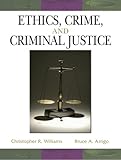Ethics, crime, and criminal justice / Christopher R. Williams and Bruce A. Arrigo.
Material type: TextPublication details: Upper Saddle River, N.J. : Pearson Prentice Hall, c2008.Description: xxiv, 308 p. ; 24 cmISBN:
TextPublication details: Upper Saddle River, N.J. : Pearson Prentice Hall, c2008.Description: xxiv, 308 p. ; 24 cmISBN: - 0131710761 (pbk.)
- 9780131710764 (pbk.)
- 345 22
| Item type | Current library | Call number | Copy number | Status | Date due | Barcode | |
|---|---|---|---|---|---|---|---|
 Books
Books
|
Main library General Stacks | 345 / WI. E 2008 (Browse shelf(Opens below)) | 1 | Available | 007320 |
Browsing Main library shelves, Shelving location: General Stacks Close shelf browser (Hides shelf browser)

|

|

|

|

|

|
No cover image available No cover image available | ||
| 344.2052523 HE.T / 1990 The world’s greatest trials / | 344.4101 / RY.E 2000 Employment law for the construction industry / | 344.4101024658 / WI.E 2003 Employment law in context : | 345 / WI. E 2008 Ethics, crime, and criminal justice / | 345.0268 / SI.J 2008 جريمة غسل الاموال | 345.76602523 GR.I The innocent man : murder and injustice in a small town / | 346 / LA.W 2007 Law no. 82/2002 on the protection of the intellectual property rights : |
Includes bibliographical references and index.
an invitation to ethics -- metaethics and moral psychology -- means and ends: the importance of consequences
Offers an introduction to the convergence of ethics and morality with issues of crime, law, and justice. Placing an emphasis on the concepts, principles and theories that comprise ethical thought, the book demonstrates how these concepts can be used to examine ethical issues within the field. Critical thinking and reasoning skills are central, as is its discussion of metaethics and moral psychology. Case studies and illustrations provide practical examples, while sound coverage of theory emphasizes how the ethics field can inform our understanding of moral issues in criminal justice. Discusses the concepts that represent ethical thought and how they can inform our understanding of moral issues in criminal justice and guide our thoughts, choices, conduct and decisions. Links issues in law, crime and justice to the broader study of ethics and morality and shows how sound reflection and reasoned decisions can resolve ethical dilemmas in the field. Equips readers with critical thinking tools that can be used repeatedly with moral and ethical concerns that arise within the field. Discusses how concepts such as free will and determinism, relativism, self-interest, moral motivation and development are critical to understanding issues and controversies in criminal justice such as lawmaking, criminal punishment, and unethical professional behavior. Case studies highlight people and events from the world of crime, law and justice and add realism to the prose. Law enforcement professionals.
1
There are no comments on this title.
